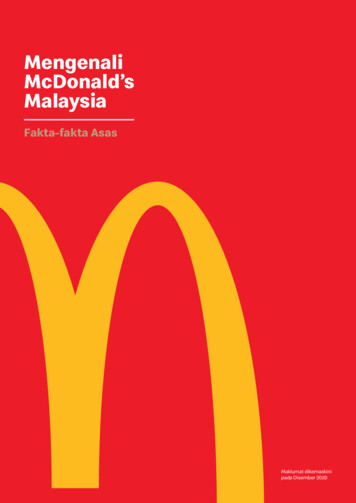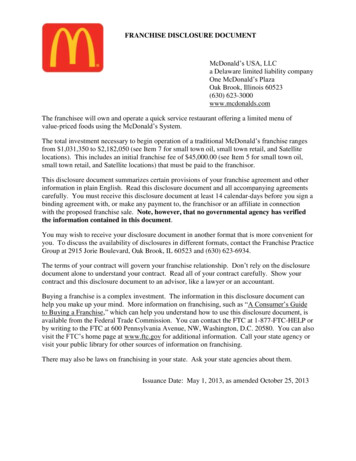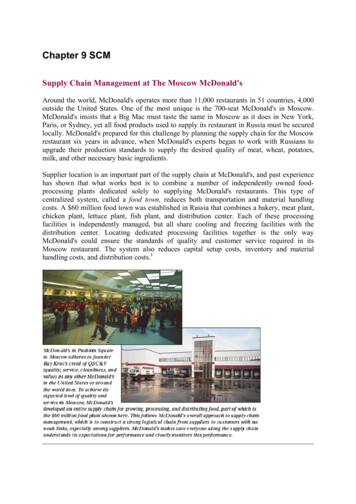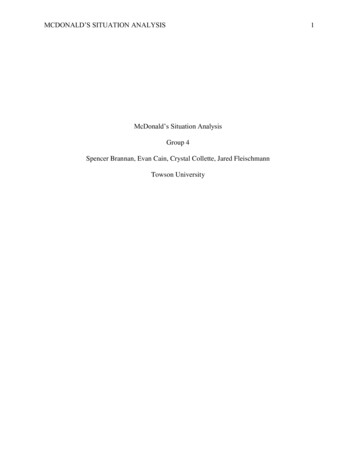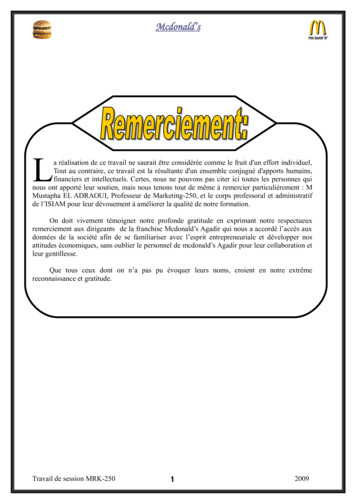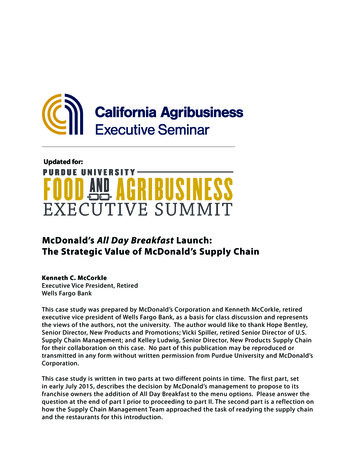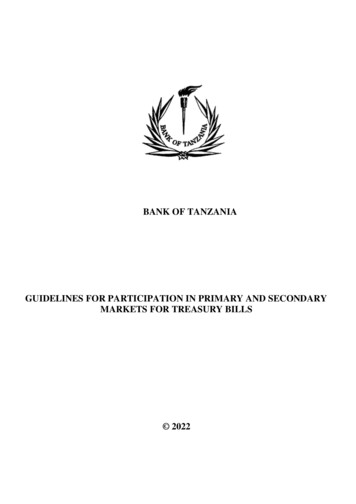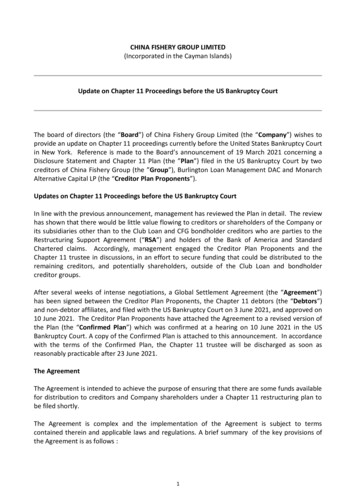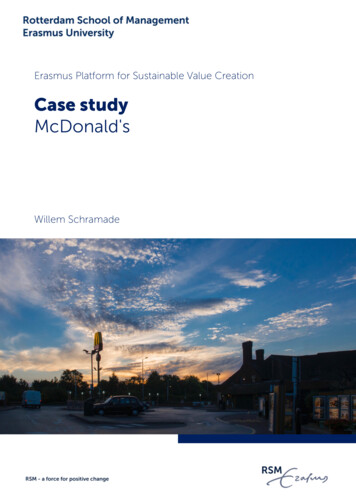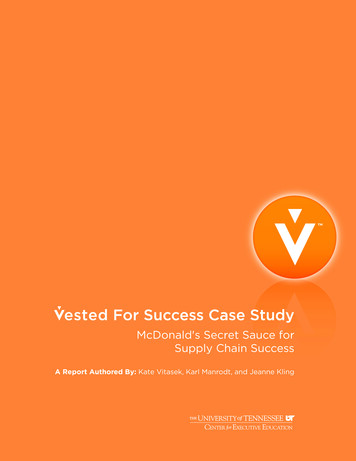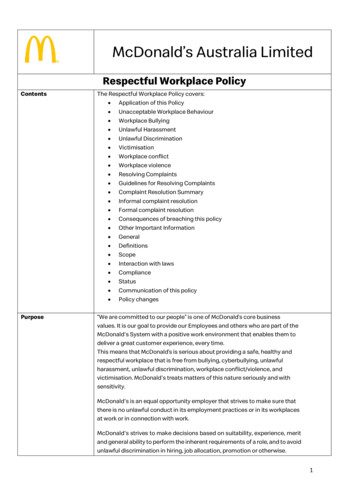
Transcription
McDonald’s Australia LimitedRespectful Workplace PolicyContentsPurposeThe Respectful Workplace Policy covers: Application of this Policy Unacceptable Workplace Behaviour Workplace BullyingUnlawful Harassment Unlawful DiscriminationVictimisation Workplace conflictWorkplace violence Resolving Complaints Guidelines for Resolving ComplaintsComplaint Resolution Summary Informal complaint resolutionFormal complaint resolution Consequences of breaching this policyOther Important Information General DefinitionsScope Interaction with lawsCompliance Status Communication of this policyPolicy changes“We are committed to our people” is one of McDonald’s core businessvalues. It is our goal to provide our Employees and others who are part of theMcDonald's System with a positive work environment that enables them todeliver a great customer experience, every time.This means that McDonald’s is serious about providing a safe, healthy andrespectful workplace that is free from bullying, cyberbullying, unlawfulharassment, unlawful discrimination, workplace conflict/violence, andvictimisation. McDonald's treats matters of this nature seriously and withsensitivity.McDonald's is an equal opportunity employer that strives to make sure thatthere is no unlawful conduct in its employment practices or in its workplacesat work or in connection with work.McDonald's strives to make decisions based on suitability, experience, meritand general ability to perform the inherent requirements of a role, and to avoidunlawful discrimination in hiring, job allocation, promotion or otherwise.1
McDonald’s Australia LimitedScopeThis Policy applies to Employees, other Workers, suppliers and licenseesin connection with work.Related Legislation andDocumentsThis Policy is not intended to override any rights or obligations under anindustrial instrument or any applicable legislation.DefinitionsReferences to McDonald's in this policy are references to McDonald's AustraliaLimited.1 This policy deals with a range of workplace behaviours, which in some cases areagainst the law.However, this Policy applies to all aspects of McDonald's business and peopleparticipating in the McDonald's System.In this Policy: "Employee" means McDonald's corporate and restaurant employees; "Worker" means a person who carries out work in any capacity for or inconnection with McDonald's business, including work as:an employee;Application of this policy the employee of a McDonald's licensee; a contractor or subcontractor; an employee of a contractor or subcontractor;an employee of a labour hire company who has been assigned to work inMcDonald's operations; an outworker;an apprentice or trainee; a student gaining work experience; or a volunteer.Application of policy to licensees, licensee employees and othersMcDonald's expects all Workers to comply with this Policy as partof participating in the McDonald's System. “Worker” specificallyincludes licensee employees.McDonald's also expects its licensees to implement this Policy. This Policyis a business policy for the purposes of a licensee’s Franchise Agreement.McDonald's expects that licensees report, and where warrantedinvestigate and address unlawful conduct that is in breach of this Policywhere those breaches involve Workers who are working in a licensee'sbusiness.However, nothing in this Policy is intended to create a relationship of2
McDonald’s Australia Limitedemployment, agent or contractor/ principal between McDonald's andany licensee employee.When does this policy apply?This Policy applies to your behaviour in connection with "work". For thepurposes of this Policy, "work" means any time at which a Worker, orwhere a relevant licensee or supplier is:UnacceptableWorkplace BehaviourWorkplace Bullying carrying out, or acting in the course of their work relating toMcDonald's (for example, when dealing with McDonald'scustomers); at work-related events (even if out of hours) such asconferences and work-related social functions; using McDonald’s equipment or facilities, (including ourcomputer and phones); in the online environment, including on social media whereWorkers, suppliers and licensees interact with colleagueswhom they have met via McDonald's operations and theiractions may affect them either directly or indirectly; or otherwise acting within the course of their work for or inconnection with McDonald's.The types of behaviour described in this section of the Policy, namely,workplace bullying, unlawful harassment (including sexual harassment),unlawful discrimination, victimisation, workplace conflict and workplaceviolence, are unacceptable while at work for, or in connection with, ourbusiness. Workers, suppliers and licensees must not engage in suchbehaviours whilst at work for, or in connection with McDonald's business orthe business of its licensees.Workplace bullying is one type of behaviour that is prohibited by this Policy.Workers are protected by this Policy whether they feel bullied by another worker, client,contractor or member of the public.What is workplace bullying?Workplace bullying is defined as repeated and unreasonable behaviour directedtowards a Worker or a group of Workers that creates a risk to health and safety.Workplace bullying can adversely affect the psychological and physical health of aperson. Repeated behaviour refers to the persistent nature of the behaviour and canrefer to a range of behaviours over time.3
McDonald’s Australia Limited Unreasonable behaviour means behaviour that a reasonable person, havingconsidered the circumstances, would see as unreasonable, includingbehaviour that is victimising, humiliating, intimidating or threatening.Examples of behaviour, whether intentional or unintentional, that may be considered tobe workplace bullying if they are repeated, unreasonable and create a risk to health andsafety include but are not limited to:abusive, insulting or offensive language or comments; unjustified criticism or complaints;deliberately excluding someone from workplace activities; withholding information that is vital for effective work performance;setting unreasonable timelines or constantly changing deadlines; setting tasks that are unreasonably below or beyond a person’s skill level; denying access to information, supervision, consultation or resources to thedetriment of the Worker; spreading misinformation or malicious rumours; changing work arrangements such as rosters and leave to deliberatelyinconvenience a particular Worker or Workers; excessive scrutiny at work;aggressive and intimidating conduct; victimisation; andpractical jokes or initiations/ hazing.Single incidents of unreasonable behaviour can also present a risk to health and safetyand are unacceptable. Even though such incidents may not amount to bullying underapplicable legislation, they may constitute a breach of applicable work, health andsafety policies.What is not workplace bullying?Reasonable management action taken by managers or supervisors to direct andcontrol the way work is carried out is not considered to be workplace bullying if theaction is taken in a reasonable and lawful way.Examples of reasonable management action may include but are not limited to: setting reasonable performance goals, standards and deadlines; rostering and allocating working hours where the requirements are reasonable; transferring a Worker for operational reasons; deciding not to select a Worker for promotion where a reasonable process isfollowed; informing a Worker about unsatisfactory work performance in an honest, fairand constructive way;4
McDonald’s Australia Limited informing a Worker about inappropriate behaviour in an objective andconfidential way; general workplace conflict; implementing organisational changes or restructuring; and taking disciplinary action, including suspension or terminating employment.Cyber BullyingCyber Bullying is a sub-category of workplace bullying, and it is prohibitedby this Policy. It is McDonald’s expectation that our Workers participate inthe online environment in the same safe and respectful way that theyparticipate in the physical work environment.What is cyber bullying?Cyber bullying in the workplace context is repeated and unreasonablebehaviour, using digital technologies (including hardware such as computers,tablets and smartphones, and software such as social media, instantmessaging, texts, emails, websites and other online platforms) directedtowards a Worker or a group of Workers that creates a risk to health andsafetyCyber bullying can happen at any time. It can be in public or in privateand sometimes only known to the target and the person bullying.Cyber bullying can include:Unlawful Harassment Abusive or hurtful texts, emails or posts, using words, images or videos; Deliberately excluding others online; Spreading gossip or rumours; and Imitating others online or using their log-in.It is unlawful to harass another Worker, or person that a Worker may come into contactwith as a result of their work, on the basis of a "protected attribute". For examples of"protected attributes", see the Discrimination section below.What is harassment? Harassment is any uninvited, unwelcome or unreciprocated behaviour thathumiliates, offends, embarrasses or intimidates another person where areasonable person would expect this to be the effect of the behaviour. Harassment can be physical, verbal or visual in nature and can occur in a singleincident or repeatedly over time. Harassment may include jokes about a person’s appearance or any otherpersonal matter that causes embarrassment. Harassment may include words or statements made by phone, text message,video, email or published online through social media or sharing sites such asTwitter, Facebook, YouTube, Snapchat and Instagram.5
McDonald’s Australia Limited Note that intention is irrelevant. Even if a person’s behaviour was not intendedto cause humiliation, offense, embarrassment or intimidation; if a reasonableperson would expect the behaviour to have that effect then it may constituteharassment.What is sexual harassment?Sexual harassment is against the law. Legal action can be taken against Workers whoengage in sexual harassment. McDonald’s, or where applicable its licensees may alsobe liable for any behaviour of its employees which amounts to sexual harassment.Sexual harassment is any uninvited, unwelcome or unreciprocated behaviour of asexual nature that humiliates, offends, embarrasses or intimidates another personwhere a reasonable person would expect this to be the effect of the behaviour. Sexual harassment can be physical, verbal or visual in nature and can occur in asingle incident or repeatedly over time. Sexual harassment may include unwelcome sexual advances whether theyinvolve physical touching or not, unwelcome physical contact such as pinchingor kissing, staring or leering in a sexual manner. Sexual harassment may include verbal comments such as comments aboutsomeone’s appearance, questions about personal or private matters,persistently inviting someone on a date after previous refusals and unwelcomerequests for sexual favours. Sexual harassment may include suggestive words, statements or drawingsmade by phone, text message, video, email or published online through socialmedia or sharing sites such as Twitter, Facebook, YouTube, Snapchat andInstagram. Note that intention is irrelevant. Even if a person’s behaviour was not intendedto be sexual in nature or cause humiliation, offense, embarrassment orintimidation; if a reasonable person would expect the behaviour to have thateffect then it may constitute sexual harassment. Where behaviour is invited, consensual and reciprocated it is not unlawful,unless the behaviour concerns someone under the age of consent. Note alsothat simply because a person is in a consensual relationship or maintains afriendship with another person, does not mean that sexual behavior willnecessarily be consensual. Sexual behavior which has not been consented toby a friend or a partner may still be unlawful. For more information about theage of consent, refer to the Personal Relationships Policy. Some types of sexual harassment may also be offences under criminal law. IfMcDonald’s suspects that a criminal incident has occurred, the matter may bereported to the police and result in criminal prosecution.6
McDonald’s Australia LimitedWhile some Workers may form personal relationships through work, these types ofrelationships may impact on the business of McDonald's and its licensees where theycreate a possibility for personal conflicts of interest. In this regard, Workers should alsofamiliarise themselves with McDonald's Personal Relationships Policy.Unlawful DiscriminationMcDonald's and its licensees are invested in creating equal opportunities inemployment practices. Practices that are unlawfully discriminatory in the processes ofhiring, assignment, performance assessment and promotion are not allowed.What is unlawful discrimination?Discrimination means the less favourable treatment of a person on the basis of aparticular personal characteristic, known as a “protected attribute”. Protectedattributes are characteristics which the law protects from discrimination. They include: Sex Gender identity, transgender status and intersex statusSexual orientation (e.g. heterosexuality / homosexuality) RaceColour National or ethnic origin Social originAge Religious belief or activityPhysical or mental disability / impairment HIV/AIDS Physical featuresFamily or carer responsibilities Marital or relationship statusPolitical opinion or activity Pregnancy and breastfeedingCriminal record (subject to important exceptions) Medical record Trade union or employer association activityCompulsory retirementDirect discrimination occurs when a person is treated less favourably than anotherperson in the same or similar circumstances because of the protected attribute. Direct discrimination may include conduct such as only hiring employees of aparticular gender or overlooking someone for a promotion because of theirrace or nationality.7
McDonald’s Australia LimitedIndirect discrimination occurs when an unreasonable requirement, condition orpractice is imposed and a person with one of the protected attributes cannot complywith the condition or practice, but most other people without the protected attributecan comply. Indirect discrimination may include conduct such as requiring all employees tocomplete an online activity which does not cater for the vision impaired.It is also unlawful to discriminate against another person because they have a closerelationship with a person with a protected attribute, for example, because a person ismarried to someone with a disability.Exceptions to unlawful discriminationFederal, State and Territory discrimination laws contain a number of exceptions. Forexample, discrimination in the area of employment may not be unlawful where: the ground of discrimination / attribute constitutes a "genuine occupationalqualification"; or the employee cannot perform the inherent requirements of the position, orrequires services or facilities to do so, but the provision of those will impose anunjustifiable hardship on the employer.Generally, it is not unlawful to make decisions and to discriminate based on mattersthat do not relate to Protected Attributes, such as conduct, performance, qualificationsor experience.VictimisationPeople should be able to make genuine complaints without fear of retaliation. Workersmust not unlawfully victimise people who make complaints about conduct in breach ofthis Policy or applicable anti-discrimination, harassment, bullying or work health andsafety laws.What is victimisation?Unlawful victimisation occurs when a person who made, or is about to make acomplaint or is involved in a complaint about workplace conduct is treated negativelyas a result of their involvement. Victimisation may include someone being dismissed because they made acomplaint alleging bullying, cyber bullying, harassment or discrimination byanother Worker, or not being rostered to work because they made a complaint.Some other examples of victimisation include treating somebodydetrimentally, creating a hostile working place for the person concerned orverbal abuse and derogatory comments. Victimisation can happen not only to someone making a complaint, but tosomeone who witnessed certain conduct or who has information about theconduct.8
McDonald’s Australia LimitedWorkplace conflictWorkplace conflict may occur when people’s ideas, decisions or actions relatingdirectly to the job are in opposition, or when two people just don’t get along. This issometimes called a “personality clash”.Workplace Violence Not all types of negative behaviour will constitute bullying, cyber bullying,harassment, discrimination or victimisation; the behaviour may instead be anexample of workplace conflict. Workplace conflict may include two managers disagreeing on the best way tolaunch a promotion, or two colleagues with differing views on a project. Workplace conflict can detract from a positive work environment, and may bemanaged using the resolution options in this Policy. Workplace conflict is not workplace bullying, but should be addressed.Workplace violence is defined as conflict between one Worker and anotherthat has escalated to the point of physical violence, physical contact or harm orthreats of a violent nature. Workplace violence may include behaviour such as punching,pushing, fighting or any other physical violence. Workplace violence may include the threat of violence, suchas threatening to harm another person or place.Workplace violence is unacceptable and will not be tolerated.Important NoteInstances of workplace violence must be reported immediately by:Guidelines forResolving Complaints Advising your Manager immediately; Contacting police where appropriate;; Contacting McDonald’s Workplace Safety department; Contacting McDonald’s Employee Relations Hotline on (02) 9875 7200 /employee relations@au.mcd.com; or Calling MAC Hotline (outside of business hours) on 1800 810 377.Our complaint resolution process intends to provide a mechanism forcomplaints to be made without fear of retaliation and to enable correctiveaction to be taken where necessary.The complaint resolution process should assist in determining whether anyinappropriate conduct has occurred, and if so, to take appropriate disciplinaryaction (up to and including termination) and implement measures to preventany recurrence.Our complaint resolution process is a guide only and McDonald's may adoptany process it deems necessary and appropriate to address an individualsituation at its discretion.9
McDonald’s Australia LimitedMcDonald's licensees are also expected to use this complaint resolutionprocess as a guide to resolving complaints made by their employees.Generally, McDonald's will address complaints made by its employees andlicensees will address complaints made by their employees. However,McDonald's may, at its discretion, address or otherwise assist in investigatingor resolving a complaint regarding conduct within a licensee business - forexample, when a complaint is received by McDonald's directly from anemployee in a licensee business.What can you do?If you believe you are experiencing or witnessing unacceptable workplacebehaviour such as bullying, cyber bullying, harassment, discrimination orvictimisation, act upon it as early as possible. McDonald’s and its licenseescannot address a problem if it is not raised and known.If you feel that you have been subject to any of the behaviours listed above, oryou have witnessed someone else experiencing the above, you may choose toresolve the matter informally or formally. If your supervisor is the person whosebehaviour is concerning you, speak to the next person of seniority in yourworkplace or contact McDonald’s People and Culture Department directly.In circumstances of alleged serious misconduct (for example, violence orsexual harassment of a criminal nature) informal resolution is not anappropriate option and you should proceed directly to making a formalcomplaint about the conduct.Before proceeding with your complaint, you should first ensure that you haveread this Policy and are familiar with the options available. You may also wishto seek further information or advice from the People and Culture Department,who may be able to help you better understand the process. You can do this bycontacting the Employee Relations Hotline on (02) 9875 7200 oremployee relations@au.mcd.com for more information.At any stage in the complaint resolution process, the individuals concerned oranyone interviewed in the investigation may have a support person. A supportperson’s role is not to be an advocate, but to provide emotional support and actas a witness. A particular individual may not be allowed to act as a supportperson in particular circumstances (for example where a conflict of interestexists). You will need to tell us in advance if you wish to bring a support personto an interview, and the identity of that person.10
McDonald’s Australia LimitedThe diagram below provides a summary of options for resolving a complaintrelating to conduct under this Policy. As set out above, the actual processfollowed may vary depending upon the nature of the allegations and theprocess that McDonald’s considers to be most appropriate in the individualcircumstances.11
McDonald’s Australia LimitedInformal ComplaintResolutionIt is possible that someone who behaving badly is not aware that theirconduct is unacceptable, unwelcome or causing distress. Accordingly, itmay be both appropriate and effective to try to resolve the issueinformally.The informal process is intended to: Give you the opportunity to resolve the matter in a personalmanner; and Give the person against whom the allegations have been madethe opportunity to take corrective action in relation to theirconduct.Options for Informal ResolutionSpeak to the other personIf you feel safe and comfortable doing so, calmly tell the other personyou have an issue with their behaviour and ask that it stop. They may notrealise the effect their behaviour is having on you and your feedbackmay give them the opportunity to change their actions. You may alsoconsider suggesting an alternate way of behaving in the circumstancethat is acceptable to you.For example, you could say:If you choose to deal with the situation personally you should consider: acting as early as possible; raising your concerns informally and in a non-confrontationalmanner; not retaliating;focusing on unwanted behaviour rather than the person; being open to feedback; andhaving the conversation in private and not in front of others.You may ask for assistance with this process or for someone toaccompany you when you approach the person. Consider askingsomeone senior that you trust to assist you – such as your Manager, asenior member of your department or a member of Human Resources.12
McDonald’s Australia LimitedFormal complaintresolutionA formal complaint should be made if either: you are not comfortable to pursue an informal method of resolution; you have tried but cannot resolve the complaint informally; or the complaint is of a particularly serious or sensitive nature.If you wish to make a formal complaint, please provide your complaint inwriting to Your Manager, a Senior member of your team, DepartmentHead. OR Complaints may also be provided directly to the People andCulture Department / Human Resources Department.Your complaint should be in writing and should set out the nature of yourcomplaint (including specific details such as dates, times, what wasdone/said and any potential witnesses) and your contact details.Responding to formal complaintsEvery complaint is different, and the approach McDonald’s (or a licensee,where relevant) will take may vary depending upon the nature of theallegations and the process that McDonald’s (or a licensee, where relevant)considers to be most appropriate in the individualcircumstances.If behaviour breaching this Policy is formally reported or observed, thefollowing types of steps may be taken in response:1.The complaint is received and allocated to a contact person.2.The contact person speaks to the parties involved as soon aspossible, and gathers information.3.Findings are made as to whether the conduct as alleged has occurred.4.The outcome of an investigation will be communicated to relevant people.5.Note, during the investigation process, parties may be required to stay awayfrom work, work in another location, or do different work, until the matter isfinalisedImportant Note:All complaints and reports will be treated confidentially as much as possible. Generally,only those people directly involved in the complaint or in resolving it will have access tothe information.Complaints made maliciously or in bad faith will result in disciplinary action, up to andincluding termination of employment.13
McDonald’s Australia LimitedWithdrawing acomplaintConsequences ofbreaching this policyComplaints may be withdrawn at any time.In most cases, if you withdraw a complaint then no further action will betaken. Where it appears that this Policy may have been breached, the conductmay be investigated in any event.Appropriate action will be taken against any person or party who is found tohave breached this Policy. These measures will depend on the nature andcircumstance of each breach and could include: a verbal or written apology; a facilitated discussion; one or more parties agreeing to participate in counselling or training; a verbal or written reprimand; and/or transfer, demotion or dismissal of the person engaging in the unacceptablebehaviour.Workers, suppliers or licensees of McDonald's may also face sanctions for breach ofthis Policy.If unacceptable behaviour has not been substantiatedIf an investigation finds unacceptable behaviour has not occurred orcannot be substantiated, McDonald’s, or where relevant a licensee, maystill take appropriate action, to address any workplace issues leading tothe report. Any such action will be at the discretion of McDonald's, orwhere relevant, a licensee.Other ImportantInformationHuman Resources / People & CultureThe role of the Human Resources team is to provide you with initial,confidential advice and support in relation to the application of this Policy.They can assist you with talking through the options available for resolvingyour concerns. Human Resources, People and Culture Managers and/orEmployee Relations Advisors cannot provide you with legal advice. You cancontact the ER Hotline on (02) 9875 7200 or speak to your Business Partner.Notes and RecordsMcDonald’s, or where relevant a licensee, may take notes and retainrecords in respect of any informal or formal complaints made under thisPolicy.14
McDonald’s Australia LimitedConfidential Employee Assistance ProgramAt any time you may seek assistance from the Employee AssistanceProgram, which provides free, confidential counselling and advice.McDonald’s EAP provider is Drake WorkWise, who may be contacted on1800 084 525, 24 hours a day, 7 days a week.Additional SupportThere are other external resources that can provide you with support ifyou are experiencing issues at work. Some of these are: Heads Up www.headsup.org.au Black Dog Institute www.blackdoginstitute.org.auVexatious complaintsMcDonald's and its licensees expect that any Worker who raises a complaintor reports bullying, harassment, discrimination or victimisation is makingsuch complaint or report on a legitimate and genuine basis. In other words,the reporter or complaint-maker genuinely believes that they or anotherperson is being bullied, harassed, discriminated against or victimised and isbringing such a complaint on that basis, and no other unrelated basis.For this reason, any complaints or reports of bullying, harassment,discrimination or victimisation which are purposefully untrue, maliciousor made in bad faith may result in disciplinary action, up to and includingtermination of employment, engagement or any other form ofassociation with McDonald's or its licensees.ResponsibilitiesCompliance, monitoring and reviewMcDonald’s expects workers, suppliers and licensees to comply with allcompany policies. Failure to comply with implemented policies may lead todisciplinary action up to and including termination. Workers should also bemindful that non-compliance with applicable Federal, State and Territorylaws may lead to prosecution, fines or imprisonment of the Workerpersonally and/or McDonald’s Australia Limited and its licenseesTo the extent that this Policy requires you to do or refrain from doingsomething, it constitutes a direction from McDonald's with which you mustcomply.Your Commitment – expected workplace behaviours15
McDonald’s Australia LimitedUnder Australian laws1, workers and other people at our workplace:(a) must take reasonable care not to have a negativeimpact on the physical or psychological wellbeing ofothers; and(b) must not unlawfully discriminate against, bully, harass or victimise others.Our leaders and managers are expected to role model appropriateworkplace behaviour, and everyone has a key role to play in maintaining arespectful workplace.Here’s a summary of what we expect from everyone who is part of theMcDonald’s System (including all Workers, suppliers and licensees)while at work, and in connection with our business: behave in a responsible and professional manner;treat others in the workplace with courtesy and respect;listen and respond appropriately to the views and concerns of others;don’t walk past problems – appropriately raise concerns;be fair and honest in their dealings with others; andmaintain confidentiality.Maintaining confidentiality means that, if you are involved in aninvestigation, either because you have made a complaint or a complainthas been made ag
McDonald's treats matters of this nature seriously and with sensitivity. McDonald's is an equal opportunity employer that strives to make sure that there is no unlawful conduct in its employment practices or in its workplaces at work or in connection with work. McDonald's strives to make decisions based on suitability, experience, merit
